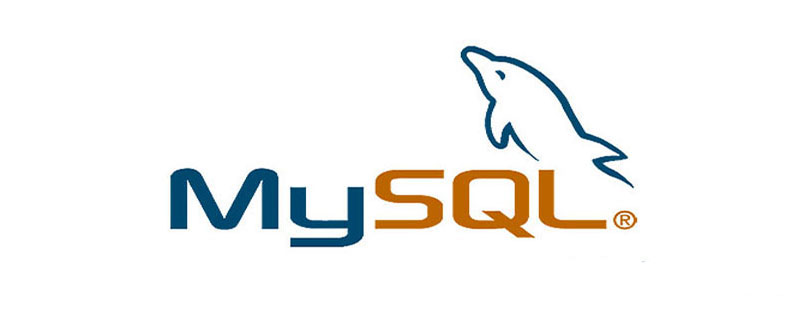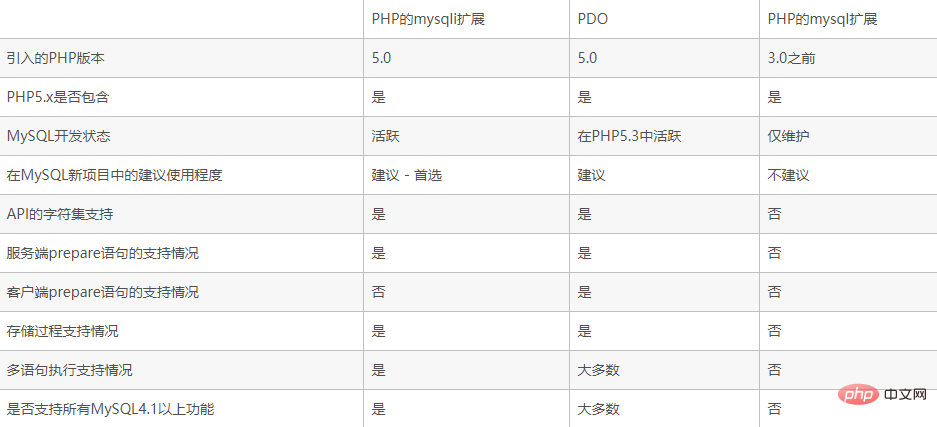Three ways to connect php to mysql database

There are three API interfaces for the connection between PHP and MySQL, namely: PHP's MySQL extension, PHP's mysqli extension, and PHP Data Object (PDO). The following is for the above three connection methods. Below is a summary to prepare for choosing the best solution in different scenarios.
(Related tutorial recommendations: mysql video tutorial)
PHP’s MySQL extension is an early extension designed and developed to allow PHP applications to interact with MySQL databases. The MySQL extension provides a procedure-oriented interface and is designed for MySQL 4.1.3 or earlier. Therefore, although this extension can interact with MySQL 4.1.3 or newer database servers, it does not support some features provided by later MySQL servers. Because it is too old and unsafe, it has been completely replaced by the later mysqli;
PHP’s mysqli extension, which we sometimes call the MySQL enhanced extension, can be used to use the new MySQL 4.1.3 or newer version. Advanced features. Its features are: object-oriented interface, prepared statement support, multi-statement execution support, transaction support, enhanced debugging capabilities, embedded service support, and preprocessing methods that completely solve the problem of SQL injection. However, it also has a disadvantage, that is, it only supports mysql database. If you don't operate other databases, this is undoubtedly the best choice.
PDO is the abbreviation of PHP Data Objects, which is a database abstraction layer specification in PHP applications. PDO provides a unified API interface that allows your PHP application to not care about the specific database server system type to be connected. In other words, if you use PDO's API, you can seamlessly switch database servers whenever needed, such as From Oracle to MySQL, only a small amount of PHP code needs to be modified. Its functions are similar to interfaces such as JDBC, ODBC, and DBI. Similarly, it also solves the SQL injection problem and has good security. However, it also has disadvantages. Some multi-statement execution queries are not supported (but this situation is rare).
The official article also makes a list comparison between the three:

Judging from the official results, msqli is recommended first , followed by PDO. Many of the results given by "folk" tend to use PDO, because it does not have the advantages of cross-database and has the characteristics of fast reading and writing speed.
1.PHP and Mysql extension (this extension has been obsolete since PHP 5.5.0 and will be removed in the future). PHP’s native way to connect to the database is process-oriented
<?php
$mysql_conf = array(
'host' => '127.0.0.1:3306',
'db' => 'test',
'db_user' => 'root',
'db_pwd' => 'root',
);
$mysql_conn = @mysql_connect($mysql_conf['host'], $mysql_conf['db_user'], $mysql_conf['db_pwd']);
if (!$mysql_conn) {
die("could not connect to the database:\n" . mysql_error());//诊断连接错误
}
mysql_query("set names 'utf8'");//编码转化
$select_db = mysql_select_db($mysql_conf['db']);
if (!$select_db) {
die("could not connect to the db:\n" . mysql_error());
}
$sql = "select * from user;";
$res = mysql_query($sql);
if (!$res) {
die("could get the res:\n" . mysql_error());
}
while ($row = mysql_fetch_assoc($res)) {
print_r($row);
}
mysql_close($mysql_conn);
?>2.PHP and Mysqli extension, process and object oriented
<?php
$mysql_conf = array(
'host' => '127.0.0.1:3306',
'db' => 'test',
'db_user' => 'root',
'db_pwd' => 'joshua317',
);
$mysqli = @new mysqli($mysql_conf['host'], $mysql_conf['db_user'], $mysql_conf['db_pwd']);
if ($mysqli->connect_errno) {
die("could not connect to the database:\n" . $mysqli->connect_error);//诊断连接错误
}
$mysqli->query("set names 'utf8';");//编码转化
$select_db = $mysqli->select_db($mysql_conf['db']);
if (!$select_db) {
die("could not connect to the db:\n" . $mysqli->error);
}$sql = "select uid from user where name = 'joshua';";
$res = $mysqli->query($sql);
if (!$res) {
die("sql error:\n" . $mysqli->error);
}
while ($row = $res->fetch_assoc()) {
var_dump($row);
}
$res->free();
$mysqli->close();
?>3.PHP and PDO extension, process and object oriented
<?php
$mysql_conf = array(
'host' => '127.0.0.1:3306',
'db' => 'test',
'db_user' => 'root',
'db_pwd' => 'joshua317',
);
$pdo = new PDO("mysql:host=" . $mysql_conf['host'] . ";dbname=" . $mysql_conf['db'], $mysql_conf['db_user'], $mysql_conf['db_pwd']);//创建一个pdo对象
$pdo->exec("set names 'utf8'");
$sql = "select * from user where name = ?";
$stmt = $pdo->prepare($sql);
$stmt->bindValue(1, 'joshua', PDO::PARAM_STR);
$rs = $stmt->execute();
if ($rs) {
// PDO::FETCH_ASSOC 关联数组形式
// PDO::FETCH_NUM 数字索引数组形式
while ($row = $stmt->fetch(PDO::FETCH_ASSOC)) {
var_dump($row);
}
}
$pdo = null;//关闭连接
?>Related recommendations: php training
The above is the detailed content of Three ways to connect php to mysql database. For more information, please follow other related articles on the PHP Chinese website!

Hot AI Tools

Undresser.AI Undress
AI-powered app for creating realistic nude photos

AI Clothes Remover
Online AI tool for removing clothes from photos.

Undress AI Tool
Undress images for free

Clothoff.io
AI clothes remover

AI Hentai Generator
Generate AI Hentai for free.

Hot Article

Hot Tools

Notepad++7.3.1
Easy-to-use and free code editor

SublimeText3 Chinese version
Chinese version, very easy to use

Zend Studio 13.0.1
Powerful PHP integrated development environment

Dreamweaver CS6
Visual web development tools

SublimeText3 Mac version
God-level code editing software (SublimeText3)

Hot Topics
 1377
1377
 52
52
 The Future of PHP: Adaptations and Innovations
Apr 11, 2025 am 12:01 AM
The Future of PHP: Adaptations and Innovations
Apr 11, 2025 am 12:01 AM
The future of PHP will be achieved by adapting to new technology trends and introducing innovative features: 1) Adapting to cloud computing, containerization and microservice architectures, supporting Docker and Kubernetes; 2) introducing JIT compilers and enumeration types to improve performance and data processing efficiency; 3) Continuously optimize performance and promote best practices.
 PHP vs. Python: Understanding the Differences
Apr 11, 2025 am 12:15 AM
PHP vs. Python: Understanding the Differences
Apr 11, 2025 am 12:15 AM
PHP and Python each have their own advantages, and the choice should be based on project requirements. 1.PHP is suitable for web development, with simple syntax and high execution efficiency. 2. Python is suitable for data science and machine learning, with concise syntax and rich libraries.
 How to open phpmyadmin
Apr 10, 2025 pm 10:51 PM
How to open phpmyadmin
Apr 10, 2025 pm 10:51 PM
You can open phpMyAdmin through the following steps: 1. Log in to the website control panel; 2. Find and click the phpMyAdmin icon; 3. Enter MySQL credentials; 4. Click "Login".
 MySQL: Simple Concepts for Easy Learning
Apr 10, 2025 am 09:29 AM
MySQL: Simple Concepts for Easy Learning
Apr 10, 2025 am 09:29 AM
MySQL is an open source relational database management system. 1) Create database and tables: Use the CREATEDATABASE and CREATETABLE commands. 2) Basic operations: INSERT, UPDATE, DELETE and SELECT. 3) Advanced operations: JOIN, subquery and transaction processing. 4) Debugging skills: Check syntax, data type and permissions. 5) Optimization suggestions: Use indexes, avoid SELECT* and use transactions.
 MySQL and SQL: Essential Skills for Developers
Apr 10, 2025 am 09:30 AM
MySQL and SQL: Essential Skills for Developers
Apr 10, 2025 am 09:30 AM
MySQL and SQL are essential skills for developers. 1.MySQL is an open source relational database management system, and SQL is the standard language used to manage and operate databases. 2.MySQL supports multiple storage engines through efficient data storage and retrieval functions, and SQL completes complex data operations through simple statements. 3. Examples of usage include basic queries and advanced queries, such as filtering and sorting by condition. 4. Common errors include syntax errors and performance issues, which can be optimized by checking SQL statements and using EXPLAIN commands. 5. Performance optimization techniques include using indexes, avoiding full table scanning, optimizing JOIN operations and improving code readability.
 PHP: Is It Dying or Simply Adapting?
Apr 11, 2025 am 12:13 AM
PHP: Is It Dying or Simply Adapting?
Apr 11, 2025 am 12:13 AM
PHP is not dying, but constantly adapting and evolving. 1) PHP has undergone multiple version iterations since 1994 to adapt to new technology trends. 2) It is currently widely used in e-commerce, content management systems and other fields. 3) PHP8 introduces JIT compiler and other functions to improve performance and modernization. 4) Use OPcache and follow PSR-12 standards to optimize performance and code quality.
 phpmyadmin connection mysql
Apr 10, 2025 pm 10:57 PM
phpmyadmin connection mysql
Apr 10, 2025 pm 10:57 PM
How to connect to MySQL using phpMyAdmin? The URL to access phpMyAdmin is usually http://localhost/phpmyadmin or http://[your server IP address]/phpmyadmin. Enter your MySQL username and password. Select the database you want to connect to. Click the "Connection" button to establish a connection.
 How to recover data after SQL deletes rows
Apr 09, 2025 pm 12:21 PM
How to recover data after SQL deletes rows
Apr 09, 2025 pm 12:21 PM
Recovering deleted rows directly from the database is usually impossible unless there is a backup or transaction rollback mechanism. Key point: Transaction rollback: Execute ROLLBACK before the transaction is committed to recover data. Backup: Regular backup of the database can be used to quickly restore data. Database snapshot: You can create a read-only copy of the database and restore the data after the data is deleted accidentally. Use DELETE statement with caution: Check the conditions carefully to avoid accidentally deleting data. Use the WHERE clause: explicitly specify the data to be deleted. Use the test environment: Test before performing a DELETE operation.




